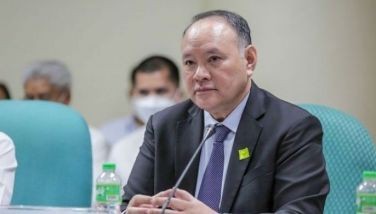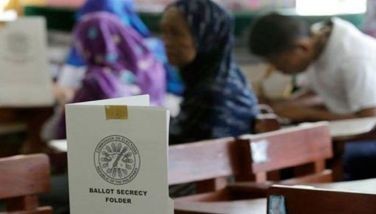Legislators protect themselves, friends
October 4, 2001 | 12:00am
(Second of a series) |
Senate President Franklin Drilon sponsored the government version of the anti-money laundering bill in the Senate. His version carried a provision authorizing the proposed anti-money laundering unit to pry into deposits above P10 million - raising the threshold amount proposed in the government bill by 20 times.
Earlier, the Senate committee on banks and financial institutions chaired by Sen. Ramon Magsaysay Jr. and the committee on justice and human rights chaired by Sen. Francis Pangilinan approved and sponsored a near replica of the inter-agency government bill.
All these versions of the bill, however, were immediately eroded after senators, reportedly led by opposition Sen. Edgardo Angara, agreed during a caucus "not to give too much powers" to the proposed anti-money laundering unit.
The "consensus" was for the proposed unit to have only the power to issue a freeze order on the suspicious account and then ask court permission to open it.
Sen. Joker Arroyo said "there was unanimity" between the majority and minority congressmen on the modified provision. "Even in countries abroad, they have to go to court (to look into the deposits). Dito lang naman capriccio ng Bangko Sentral yang powers (It’s only here where the Central Bank wants the powers)," he said.
The provision was eventually adopted by the bicameral conference committee and contained in Section 11 of Republic Act 9160 or the Anti-Money Laundering Law of 2001.
"The AMLC (Anti-Money Laundering Council) may inquire into or examine any particular deposit or investment with any banking institution or non-bank financial institution upon order of any competent court when it has been established that there is probable cause that the deposits or investments are in any way related to a money laundering offense," it read.
While the new law relaxed the foreign-currency deposits law which guards "absolute confidentiality" of foreign-currency accounts, it nonetheless makes it more tedious for authorities to prosecute money launderers. For each offense, the AMLC has to file at least three cases with the courts: for the criminal act of money laundering, for seeking an extension to the 15-day freeze order required by law, and for gaining access to the deposits. It may also have to ask the Court of Appeals or the Supreme Court to lift a temporary restraining order on the frozen asset, which the law allows.
But he does not deny that the final form of the law was influenced by the "free" advice to the leadership of both the Senate and the House provided by former central Bank governor Gabriel Singson. Aside from being a staunch defender of the bank secrecy laws when he was the monetary chief under the Ramos administration, Singson is also known in business circles as a lawyer and adviser to the country’s biggest Chinese-Filipino taipans.
He currently sits on the board of the Gokongwei family’s flagship firm JG Summit Holdings, Inc., chairs the Yuchengco Group’s insurance arm Great Pacific Life Assurance Inc., and is a known adviser to Philippine Airlines, Asia Brewery and Philippine National Bank majority owner Lucio Tan. Singson is also the presidential adviser on banks and foreign loans under the Arroyo administration though he said this was "just a title."
In an interview, Singson admitted giving advice on the anti-money laundering bill to Drilon and Speaker Jose de Venecia. So does his nephew, Peter Favila, who is a consultant to the Speaker, he said. A former president of Allied Bank, Favila resigned two months ago, but was retained as a consultant of the Lucio Tan-owned bank.
Government sources said Singson was already asking the Bangko Sentral to preserve the provision of the secrecy law requiring a court order when the inter-agency bill was still being drafted in May. The former governor also reportedly argued that there should be "due process" so as not to drive away depositors, especially the Chinese. His "strong suggestions," however, were rejected by the inter-agency body, but not by Congress.
Yet, when interviewed, Singson said he believed the anti-money laundering unit did not need a court order to look into deposits. He added that he shared these views with Drilon. "I don’t think there’s a need for a court order. The case already has to pass through two collegiate bodies: the Monetary Board and the (anti-money laundering) unit. There are enough safeguards (under the law)."
Asked if he saw any conflict of interest in his role as adviser to both lawmakers and taipans, Singson said: "I do not offer my advice; I only give them when I’m asked. I do this on my own, and it’s not so often."
Drilon said he sees nothing wrong with getting advice from Singson - "a professional and good lawyer" - despite his links with the taipans. "I personally consult him because I was not familiar with this law before and he came from the central bank. Those attributions to those people are misplaced. He is very professional," Drilon said.
For his part, De Venecia said Singson "has very good ideas" on the anti-money laundering bill.
(To be continued)
BrandSpace Articles
<
>
- Latest
- Trending
Trending
Latest
Trending
Latest
Recommended






























